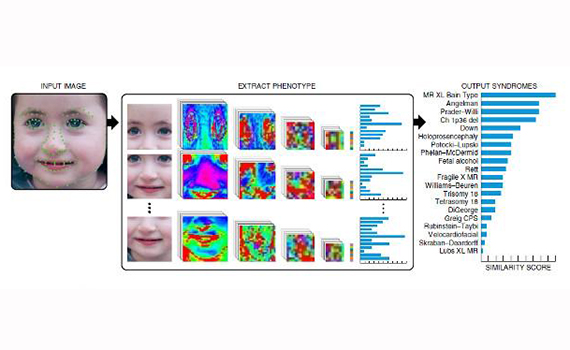
Researchers have developed an artificial intelligence system that allows you to accurately diagnose 216 rare hereditary diseases from a photograph. As reported in Nature Medicine , she was taught to recognize a genetic disorder (choose from the 10 most likely options) with 91 percent accuracy.
Scientists also simplified the application of the system in practice: they created a mobile application for medical professionals, which allows you to determine the genetic disorder from a photograph of a patient.
It is often difficult to diagnose a hereditary disease. There are several thousand diseases associated with genetic disorders, most of which are extremely rare. Many doctors during their practice may simply not be confronted with similar diseases, therefore a reference computer system that would help recognize rare hereditary diseases would facilitate diagnosis.
Therefore, American, German and Israeli scientists and employees of FDNA, under the leadership of Yaron Gurovich from Tel Aviv University, developed the DeepGestalt facial recognition system, which made it possible to diagnose several hundred diseases. Using convolutional neural networks, the system divides the face into separate fragments with dimensions of 100 × 100 pixels and predicts the probability of each disease for a particular fragment. Then all the information is summarized and the system determines the likely disorder for the person as a whole.
Researchers have trained the system to distinguish a specific hereditary disease from a number of others. For training, they used 614 photographs of people suffering from Cornelia de Lange syndrome – a rare hereditary disease that manifests itself, including in the form of mental retardation and congenital malformations of internal organs.
DeepGestalt distinguished Cornelia de Lange syndrome from other diseases with an accuracy of 97 percent (p = 0.01). The authors of other studies failed to achieve 87 percent accuracy, while experts put the correct diagnosis, on average, 75 percent of cases. In another experiment, scientists used 766 photographs of patients. Angelman syndrome (“Parsley syndrome”), which, inter alia, is characterized by chaotic movements, frequent laughter or smiles. The system recognized the disease with an accuracy of 92 percent (p = 0.05); in a previous study, the determination accuracy was 71 percent.
The researchers also made it easier for DeepGestalt to be used in practice – they created a phenotype diagnostic platform for hereditary diseases, as well as a Face2Gene mobile app for doctors, with which the doctor can diagnose his patient.





